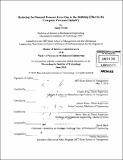Reducing the demand forecast error due to the bullwhip effect in the computer processor industry
Author(s)
Smith, Emily (Emily C.)
DownloadFull printable version (7.171Mb)
Other Contributors
Leaders for Global Operations Program.
Advisor
Charlie Fine, Abbott Weiss and Henry Marcus.
Terms of use
Metadata
Show full item recordAbstract
Intel's current demand-forecasting processes rely on customers' demand forecasts. Customers do not revise demand forecasts as demand decreases until the last minute. Intel's current demand models provide little guidance for judging customer orders when the market changes. As a result, during the economic downturn of Q3 and Q4 '08, Intel's model could not predict how much billings would decrease. The demand forecast had large amounts of error caused by the bullwhip effect (order amplification in a supply chain). This project creates a new demand forecast model in two phases. The first phase investigated the supply chain of OEMs and Retailers. The second phase of the project used the supply chain information discovered in phase one to create a new demand forecast that reduces the error caused by the bullwhip effect. The first phase determined that the average time it takes a CPU to go from Intel to end customer purchase is seventeen weeks. The first phase also indentified ownership of products throughout the supply chain and parties making purchase decisions. The supply chain information was then used in the second phase of the project to create a demand forecast model. The new model is a heuristic model that simulates quarterly purchase decisions of retailers and OEMs including lead times and inventory. The resulting model allows Intel to monitor and react to consumption changes faster than waiting for customers to change their demand forecasts. The model also provides a better forecast during times of change. The model reduces the error due to the bullwhip effect and indentifies early when a downturn or upturn is going to happen in ordering behavior.
Description
Thesis (M.B.A.)--Massachusetts Institute of Technology, Sloan School of Management; and, (S.M.)--Massachusetts Institute of Technology, Dept. of Mechanical Engineering; in conjunction with the Leaders for Global Operations Program at MIT, 2010. Cataloged from PDF version of thesis. Includes bibliographical references (p. 70-71).
Date issued
2010Department
Leaders for Global Operations Program at MIT; Massachusetts Institute of Technology. Department of Mechanical Engineering; Sloan School of ManagementPublisher
Massachusetts Institute of Technology
Keywords
Sloan School of Management., Mechanical Engineering., Leaders for Global Operations Program.